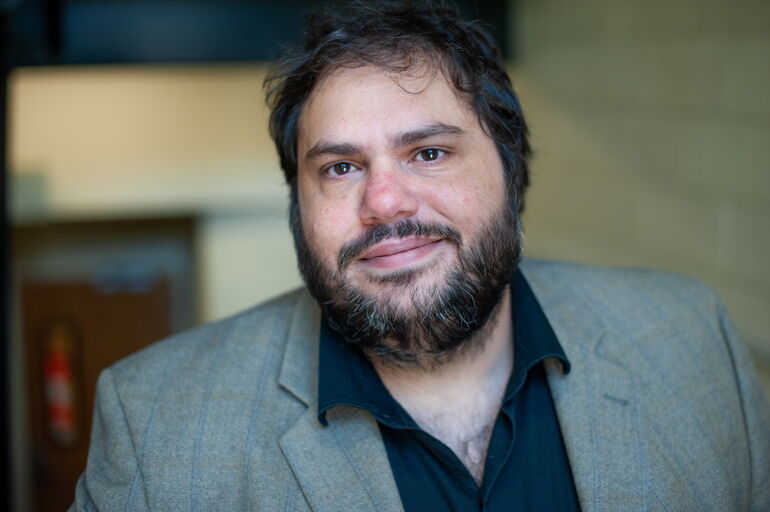Processing Your Payment
Please do not leave this page until complete. This can take a few moments.
- News
-
Editions
View Digital Editions
Biweekly Issues
- May 13, 2024
- April 29, 2024
- April 15, 2024
- April 1, 2024
- March 18, 2024
- March 4, 2024
- February 19, 2024
- February 5, 2024
- January 22, 2024
- + More
Special Editions
- Lists
- Viewpoints
- HBJ Events
- Business Calendar
- Custom Content
On cybersecurity, UNH is all in
 PHOTO | Contributed
Ibrahim (Abe) Baggili
PHOTO | Contributed
Ibrahim (Abe) Baggili
Businesses in Connecticut and around the country face a shortage of qualified workers as they try to build their defenses against malicious hackers and cyber attacks.
Ibrahim (Abe) Baggili, the Elder family endowed chair of computer science and cybersecurity at the University of New Haven, is on a mission to fill that talent gap.
Baggili spearheads the university’s nationally recognized cyber forensics lab and has led student hacking teams to defeat bigger-name schools like Carnegie Mellon University in competition. He also runs a popular summer camp for high school students eyeing cybersecurity as a possible career path.
Under his leadership, UNH’s cybersecurity program this year was awarded a $4 million grant from the National Science Foundation and became one of only three in the Northeast to be designated a National Center of Academic Excellence in Cyber Operations by the National Security Agency.
New Haven BIZ spoke with Baggili recently about his efforts to develop the next generation of cybersecurity workers and his take on how Connecticut is preparing to fend off future attacks.
The University of New Haven recently received a $4 million grant from the National Science Foundation to help build a workforce with the skills to protect the country from cyber attacks. Tell us about it.
The program provides scholarships for undergraduate and graduate students studying cybersecurity and computer science who agree to work for the government when they graduate. For our best students, we can offer them in their final year of undergraduate studies a scholarship that pays their full tuition and gives them cash stipends for living expenses, books and travel. Students will be given a one-year scholarship toward their bachelor’s degree and two years of support to complete their masters. For every year of the scholarship, students must spend one year working at a local, state, tribal or federal government cybersecurity job.
Companies are not thinking about cybersecurity as much as they should be — or they’re only thinking about it once they’re attacked and it costs them a lot of money.
UNH was one of the first in the state to launch a cybersecurity program in 2013. What kind of demand is the program generating?
We’ve had significant growth to the point where we’re building bigger classrooms just to be able to hold our student population — and we’re hiring more faculty, too. We’re trying to hire at least one [new faculty member] this year. We’re kind of like a lean startup that has so much demand and we’re trying to figure out what we’re going to do [to satisfy it]. I always tell students that if you’re interested, you need to apply very early.
Yet there still are 2,600 unfilled cybersecurity jobs in Connecticut. What else can be done?
We need to create a pipeline when people are young to get them interested. Our method and our approach is not only about the college program. We’re reaching out way above and beyond that to students in high school. Our GenCyber Agent Academy [summer] camp is the only one in Connecticut and is open to students entering ninth to 12th grade. It’s an entirely [National Security Agency and National Science Foundation ] grant-funded program where kids don’t pay a penny to attend. Last year we got 162 applicants and we only accept 40 — 20 boys and 20 girls. We’re trying to get high school students to think about cybersecurity as a career because the market demand is huge. There are expected to be 3.5 million job openings worldwide by 2021 and we don’t have enough [workers] to sustain it.
Although some say the state’s colleges and universities need to do more to meet the demand, you’ve cautioned against schools rolling out new cybersecurity programs too hastily. Why?
Cybersecurity is a hot topic and everyone’s talking about it. But we have to make sure that whatever university chooses to embark on this path, that they truly understand what they’re getting themselves into. While I’m happy that universities are creating programs, there needs to be a very stringent measure of quality. Companies are going to be putting their futures in the hands of these kids. We can’t be giving them fluffy cybersecurity degrees. They have to be really employable when they graduate.
What separates a “fluffy” program from a high-quality one?
First of all, you have to hire the right faculty to teach these courses. You can’t develop a real cybersecurity program without having real cybersecurity professionals teaching the courses. And those people cost a lot of money, because you’re competing with industry [to hire and retain them]. My undergraduate students are starting at $100,000 a year. An assistant professor gets paid $80,000 to $90,000 a year. Universities embarking on this journey need to really get it in their heads that if you can’t pay the faculty enough money, you’re not going to have a great program. The other key thing is you have to have real, deep, hands-on activities in every class.
How would you characterize Connecticut’s preparedness against cyber attacks?
We need to invest heavily in creating a cybersecurity culture in the state of Connecticut, which is yet to come. It needs to be a top priority across all business sectors. Many companies are not thinking about cybersecurity as much as they should be — or they’re only thinking about it once they’re attacked and it costs them a lot of money. There are many cities [in Connecticut] that have already been hit by cyber attacks. West Haven was hit, Hamden was hit and I think the list is going to continue to grow.
What else should the state be doing?
We need a state and private-sector funded cyber hub which we would be more than happy to host on our campus if we could get the right funding. I see it as a neutral place where the government and academia and the private sector can meet in Connecticut to work together on cybersecurity issues. But we can’t do it without the state being behind us and without the private sector being behind us.

2022 Giving Guide
This special edition informs and connects businesses with nonprofit organizations that are aligned with what they care about. Each nonprofit profile provides a crisp snapshot of the organization’s mission, goals, area of service, giving and volunteer opportunities and board leadership.
Learn more
Subscribe
Hartford Business Journal provides the top coverage of news, trends, data, politics and personalities of the area’s business community. Get the news and information you need from the award-winning writers at HBJ. Don’t miss out - subscribe today.
Subscribe
2024 Book of Lists
Delivering Vital Marketplace Content and Context to Senior Decision Makers Throughout Greater Hartford and the State ... All Year Long!
Read Here-
2022 Giving Guide
This special edition informs and connects businesses with nonprofit organizations that are aligned with what they care about. Each nonprofit profile provides a crisp snapshot of the organization’s mission, goals, area of service, giving and volunteer opportunities and board leadership.
-
Subscribe
Hartford Business Journal provides the top coverage of news, trends, data, politics and personalities of the area’s business community. Get the news and information you need from the award-winning writers at HBJ. Don’t miss out - subscribe today.
-
2024 Book of Lists
Delivering Vital Marketplace Content and Context to Senior Decision Makers Throughout Greater Hartford and the State ... All Year Long!
ABOUT
ADVERTISE
NEW ENGLAND BUSINESS MEDIA SITES
No articles left
Get access now
In order to use this feature, we need some information from you. You can also login or register for a free account.
By clicking submit you are agreeing to our cookie usage and Privacy Policy
Already have an account? Login
Already have an account? Login
Want to create an account? Register
Get access now
In order to use this feature, we need some information from you. You can also login or register for a free account.
By clicking submit you are agreeing to our cookie usage and Privacy Policy
Already have an account? Login
Already have an account? Login
Want to create an account? Register





0 Comments